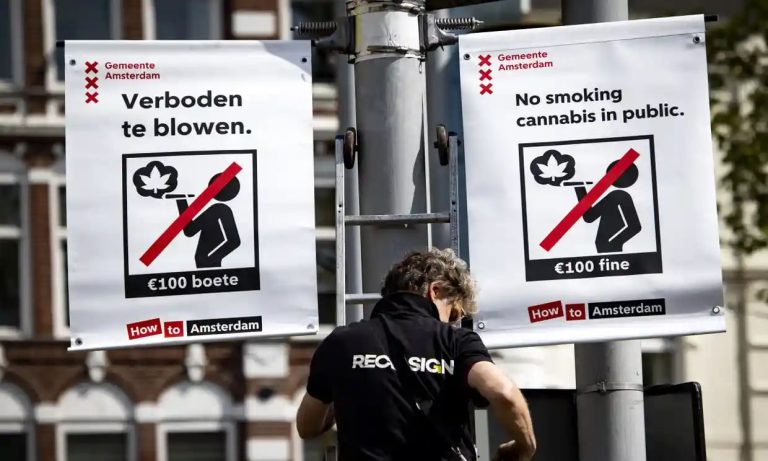A new era kicked off in Amsterdam’s Red Light District on Thursday, with a ban on smoking cannabis on the streets officially taking effect.
The ban is part of a city-wide effort, pushed by Mayor Femke Halsema, to make the famous area more hospitable to its residents and workers.
According to Reuters, signs “were posted in the canal-lined neighbourhood known for its brothels, sex clubs and marijuana cafes, which attract millions of tourists a year, but are a nuisance to residents.”
Those found in violation of the new law will face a €100 (or about $110) fine.
The law was proposed earlier this year by the Amsterdam city council.
“Residents of the old town suffer a lot from mass tourism and alcohol and drug abuse in the streets. Tourists also attract street dealers who in turn cause crime and insecurity. The atmosphere can get grim especially at night. People who are under the influence hang around for a long time. Residents cannot sleep well and the neighborhood becomes unsafe and unlivable,” the city council said in a statement at the time.
“A smoking ban on the street should reduce nuisance. We are also looking at a pick-up ban at certain times for soft drugs. If the nuisance does not decrease enough, we will investigate whether we can ban smoking on terraces at coffee shops,” the council added.
The city council gave final approval to the proposal earlier this month, setting the stage for Thursday.
According to Reuters, people “will still be allowed to smoke inside and on the terraces of coffee shops selling marijuana and hash in the district and other parts of the city.”
The pot smoking ban is part of an effort led by Halsema, Amsterdam’s first female mayor, to improve conditions in the Red Light District.
CNN reported in 2019 that Halsema had “presented four options aimed at protecting sex workers from degrading conditions, tackling crime, and reducing the impact of tourism in Amsterdam’s De Wallen red-light district.”
“Four scenarios have been proposed for discussion including closing the curtains on the windows so sex workers can’t be seen from the street, fewer window-style rooms, moving the brothels to new locations elsewhere in Amsterdam and the possibility of a sex worker “hotel” being created,” according to CNN. The plans aim to protect sex workers from gawking tourists and their camera phones, and also to combat a rise in abuses such as human trafficking. The four proposals will be discussed with sex workers, residents and businesses in July, before being taken to the city council in September. The plans will ultimately be developed into a new policy on sex work, the mayor’s office confirmed.”
The Red Light District, known locally in Amsterdam as the De Wallen neighborhood, has long been a popular destination for tourists visiting the city.
CNN reported earlier this year that it is “estimated that about 10% to 15% of Amsterdam’s tourist industry is based in the red light district.”
“City officials want the De Wallen neighborhood, as the district is known in Dutch, to draw visitors who can appreciate its unique heritage, architecture and culture rather than sex and drugs,” CNN reported at the time. Over the past few years, there have been multiple initiatives to reduce the impact of mass tourism and nuisance visitors, and to revamp the area’s image.
In 2020, guided tours were prohibited from passing sex workers’ windows, and there was talk of moving the window brothels to a neighborhood outside of the city center—conversations that continue to this day.”
